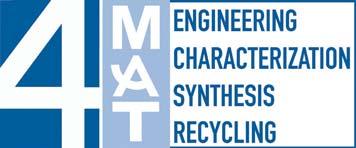
2 minute read
The 4MAT Department The Specialist in Inorganic Materials
by 5rXobdlLrFp
With an annual average turnover of €1.5 million generated by its research projects, the 4MAT Department from the Université libre de Bruxelles has a staff of 35 collaborators, including 3 professors and 9 technicians. Specializing in inorganic materials, it totals between 3 and 4 thesis defenses each year.
Ranging from the fundamental to the application, the research work of the 4MAT Department follows three main structural axes. The first one involves environment and energy. In terms of the environment, 4MAT researchers conduct environmental assessments on biosourced materials, recycling of minerals, metals and electronic waste. As for energy, they work on the interseasonal storage of energy and its transformation from biosourced materials.
Advertisement
The second research axis concentrates on germination and growth. In doing so, 4MAT researchers synthesize thin films by low pressure plasma for intelligent glazing and mechanical applications; they cooperate with the UMONS, UGent and UAntwerpen on a new EoS project on the fixation of atmospheric nitrogen by plasma; and they work on the reactivity of cements (recycling, waterproofing) and on crystallization processes. Belgium, too. At the level of public regional funding, it takes part in Innoviris projects in Brussels, as well as in FEDER projects and other projects approved by the competitiveness clusters GreenWin, MecaTech and Skywin in Wallonia.
All these different projects address a major array of challenges in inorganic materials research. “Doing with less” and “Design for recycling” embody the two current tendencies; they still have to be made compatible. In addition, 4MAT will continue to work on materials for energy, recycling of cementitious materials (vital in construction); the CO 2 conversion via plasma or other ways and additive manufacturing for the design of complex parts (for example in aeronautics), according to the principles of eco-design and recycling. With, in perspective, increased performance as well as energy and materials savings. Three good reasons to contact 4MAT!
Lastly, the third research axis of 4MAT concentrates on the control of the microstructures of bulk materials: development of very resistant glass for GSM or tablet screens; production of critical parts for aerospace via 3D printing or additive manufacturing (in collaboration with the VUB and the UCL); and the development of new steels with enhanced mechanical properties for the automotive industry.
To carry out these tasks successfully, the 4MAT Department relies on a major technical platform which combines synthetic equipment (low or medium-pressure reactors; high temperature furnaces; liquid phase reactors for chemical crystallization and synthesis); and characterization equipment (structural and elementary characterization, thermal analysis up to 1.500°; mechanical and surface characterization). 4MAT also applies high temperature synthesis methods, which remains unusual in Belgium. In addition, it uses various software packages for Life Cycle Analysis. Titanium structure produced by 3D printing: microstructure at room temperature (left) and high temperature modeling of microstructure (right)

At present, 4MAT involves itself in a European FP7 program, SOTHERCO. Under the “Energy” call for tender, this program focuses on energy storage via a porous matrix impregnated with a chemical compound. Moreover the Department is part of TeacHy, a European project aiming to conduct distance education on hydrogen and fuel cells. 4MAT also took part in other projects in the previous framework programs, whether oriented towards research or SMEs. The department operates actively in
4MAT Service Université Libre de Bruxelles Avenue Paul Héger - Bâtiment U - Porte D - Local UD2-116 B-1000 Bruxelles Tel.: +32 (0)2 650 29 52 Email: shismail@ulb.ac.be - http://4mat.ulb.ac.be/










